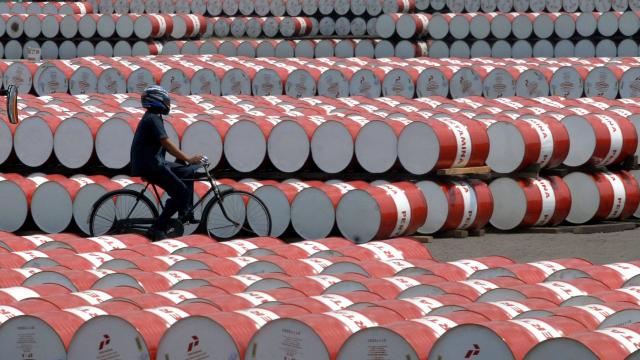From airlines flying ghost flights to simultaneous food shortages and overproduction, coronavirus is making the absurdity of how markets function very clear. Now, amid the collapse of the global oil market, traders are spending millions of dollars a day to store a record amount of unused crude oil on giant container ships.
The coronavirus pandemic has more than 100 countries in lockdown, forcing billions of people to leave their cars parked and cancel travel plans and entire sectors of the economy to come to a halt. As a result, global demand for oil has plummeted, leaving the industry with a historic glut and increasingly fewer places to store it.
Some 160 million barrels of excess crude are now being stored on ships, most of which are supertankers which hold about 2 million barrels each, according to Reuters. The rates to charter these vessels has doubled in the past month, sometimes reaching $US350,000 ($550,055) a day, and traders are chartering dozens of them. That essentially amounts to oil companies spending millions of dollars everyday to keep pumping oil and store it on boats. Refineries and tank farms on land are also quickly filling up, and the industry is still rushing to find space to store even more crude oil.
This is thought to be the most unused oil being stored at sea in history. The last one that came close was during the 2009 financial crisis, when traders stored roughly 100 million barrels on offshore tankers.
Generally, when demand is low for a product, it makes sense to stop producing so much of it. But that’s not what’s happening here.
Sure, major oil producers agreed to cut production by 9.7 million barrels last weekend. But to meet the rate at which demand is falling, the world would have to reduce production by three and a half times that much. That means we could see even more tankers holding oil at sea. The Reuters report notes that while up to 40 supertankers are being commissioned through the end of April, the continued production of oil could mean the number of massive ships storing oil could jump fivefold in the next few months.
Cutting oil production wouldn’t just reduce the number of tankers commissioned. It’s also necessary to transitioning to renewable energy.
This isn’t just a good idea for the climate, it’s also a good financial decision. In fact, a new report shows that investing in renewables can support a resilient and equitable economic recovery from the covid-19 pandemic and create millions of jobs.
